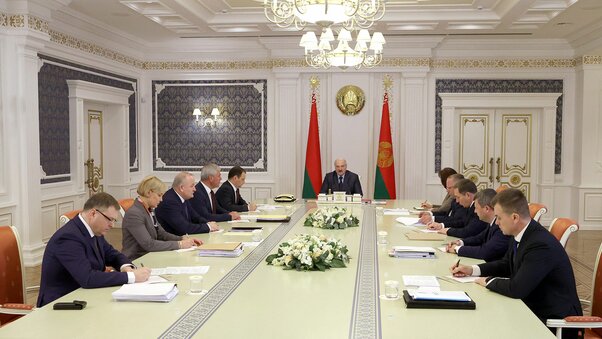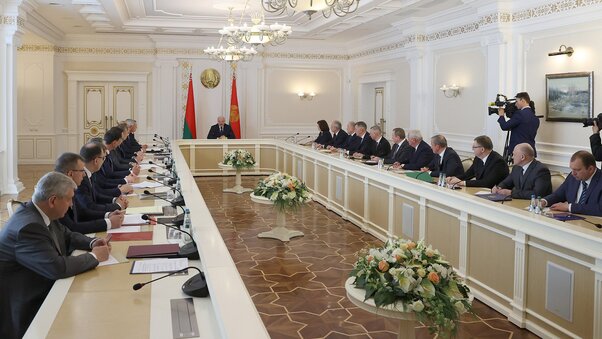Meeting with senior government members
- 10
- 14:38
Belarusian President Aleksandr Lukashenko hosted a meeting with senior members of the Council of Ministers on 22 July.
Opening the meeting, the head of state noted that regulatory activity is one of the functions of the President. “The President is involved in the legislative process perhaps even more than the legislative branch of power. It is a good tradition to come together to review the most important and relevant regulations,” the President said.
“We are to discuss very important draft documents designed to improve public administration and regulation of economic relations. Before they are signed or rejected (it will become clear after the discussion), I would like to consult with you. Therefore, I invited key representatives of the power vertical,” the head of state said.
The President emphasized that when discussing these draft documents, the focus should be made on utility, economic efficiency and, of course, social justice. “Indeed, all are equal before the law and the law must be observed. However, you cannot write everything down in laws. And not a single state has yet been able to formalize all the things the society and the state live by. Therefore, very often when taking certain decisions, we are guided by what is fair,” Aleksandr Lukashenko said.
The head of state illustrated his point using the following example: “No one is against privatization, everyone means well. However, the biggest question here is not about the law but about justice: will it be fair if a company created by the entire nation and even the previous generations gets into the hands of one person? We face this question all the time.”
One of the proposals dealt with disposal and storage of radioactive waste. Aleksandr Lukashenko noted that this type of waste is produced during the operation of sources of ionizing radiation, which are actively used in science, medicine, manufacturing industry and defense complex. The second power unit of the Belarusian nuclear power plant will be put into operation soon, thus the power plant will become the main source of radioactive waste.
The government also proposed to set up a special department for radioactive waste management and a designated organization that will collect, recycle, store and dispose of such waste.
The President emphasized that nuclear waste is not only a very dangerous, but also very valuable raw material. “This is an extremely valuable product. And the following question arises today: what will we do with this valuable, but very dangerous product that is new to our country? This is a serious issue and a product of great value,” the head of state said. “As international practice shows, the management of such waste requires the creation of a unified system run by the state. In fact, this is a new branch of the economy,” the President added.
As far as foreign economic activity is concerned, the Council of Ministers proposed to introduce the positions of official representatives of the ministries of industry, agriculture and food at the embassy in China, as well as to optimize the service personnel numbers at all diplomatic missions. “The government and the Ministry of Foreign Affairs were tasked to carry out optimization. Increasing our presence on our main markets (be it Russia, China, India, the markets we are focusing on now and the countries where we are welcome) and optimizing workforce at the embassies that are making little headway today due to certain circumstances,” Aleksandr Lukashenko explained.
To fully digitalize accounting, control and payment of taxes and to improve tax administration, it was proposed to expand the staff of the Tax and Duties Ministry. “I would like to hear the reasoning behind it. Could you explain how additional employees of the Tax and Duties Ministry will ease relations between taxpayers and tax authorities, ensure the de-bureaucratization of this field and simplify tax administration?” Aleksandr Lukashenko asked.
“All proposals imply additional public spending. In this regard, we need rock-solid guarantees that these expenditures are relevant, unavoidable, efficient and generate more profits than losses. We must be sure that these proposals will help tackle the most important tasks - from nuclear safety to export growth,” the President said.
One of the draft decrees discussed at the meeting concerns amendments to the legislation on the establishment and operation of holding companies. The document includes provisions aimed at improving the legal status of holding companies, their creation and functioning, as well as specifics of the operation of holding companies co-owned by the state.
“You know my attitude to it. First of all, legislation should not be revised often. Second, if we supplement or amend it, we should make sure that everything is taken into account,” the President said. He noted that the matters covered by the draft decree affect a large number of economic operators. At present, the state register features 95 holding companies acting as umbrella organizations for 643 enterprises. They account for almost a quarter of the country’s industrial output.
“Therefore, I would like to hear a more solid analysis of how these proposals can benefit enterprises. Are they in touch with reality, do we need to do it now, what benefits will these proposals produce and how useful will they be?” the head of state asked.
The participants of the meeting also discussed government proposals on the regulation of basic forms of entrepreneurial activity - individual entrepreneurs and self-employed business people. The President emphasized that he had repeatedly urged to sort things out in this field. First of all, it is necessary to clearly define who are individual entrepreneurs, what they will do, what taxes they will pay. The head of state criticized the current state of things in this field: “We will soon have 12 million individual entrepreneurs! Our entire population is smaller! We have created a huge offshore company where people do not pay anything but are treated by the law as individual entrepreneurs - from journalists (a great number of examples) to officials.”
In addition, the President recalled his demand to come to grips with envelope salaries. “The system should work in such a way as to make envelop salaries impossible. I know that you are actively working on it, but I want business people, entrepreneurs to hear me: there’ll be hell to pay, so you should not take offense. Tax evasion and shadow turnover in trade and services are unacceptable,” the Belarusian leader noted.
At the same time, tax breaks are also possible for certain groups of the self-employed, the head of state believes. “One should not stifle people’s entrepreneurial spirit. People want to work, earn money. A talented person paints pictures, weaves baskets or does what only a few do in our country - such people should always be supported, including through tax breaks, so that they could pay very low taxes and focus on their crafts,” Aleksandr Lukashenko said.
The head of state instructed the government to think everything through once again together with MPs, relevant ministries and local authorities. “This topic should be approached with utmost responsibility, all the risks must be analyzed, including risks for employment, budget revenues and regional development. If the legislation has to be overhauled, we need to outline the stages of this process,” Aleksandr Lukashenko noted.
In addition, the participants of the meeting discussed the transition to a new system of postgraduate training [a two- or three-year obligatory residency program for specialty care providers]. “This is a very serious topic,” Aleksandr Lukashenko emphasized. “We must decide whether we need to break the existing system in an attempt to improve it. And most importantly, is it well-timed?” the President asked.
The head of state emphasized that this matter requires additional study and comprehensive discussion.
“A very important question: will we be able to retain the best achievements of the national healthcare system in the pursuit of other people’s standards?” Aleksandr Lukashenko asked. According to him, this applies not only to healthcare and education, but also to other areas. The head of state is convinced that there is no need to blindly follow and adopt foreign trends, but it is necessary to improve the domestic system, preserving the best expertise and knowledge.
“We often say ‘look what kind of constitution they have abroad’, something else. Do we really need to rush to embrace this ‘democracy’ and move in this direction? Years pass (I have been President for several years already), and it turns out that we should not have done it,” the President said. He cited reforms in education as a case in point, when Soviet-style education system was overhauled in pursuit of the world’s best practices, and then it turned out that the Soviet education system was not bad at all.
The head of state continued: “The same way the government and the Ministry of Foreign Affairs started chasing ‘democracy’ and ended up having nearly two thousand NGOs, bandits and foreign agents in a small country like ours (Makei should not take it personally again, this had been happening before him, he inherited it, we need to sort it out now). So what, did you get this democracy?”
“We have recently realized: this is detrimental to the state! A cleanup is underway. Do you think it is easy?” Aleksandr Lukashenko continued. “Thousands of people are working there, our people who were brainwashed using someone else’s money,” he added.
The President once again stressed that it is necessary to be very careful with various kinds of reforms. “Of course, we should not be retrogressive and stick to the things that became antiquated, because in this case we will lag behind in general,” he said. “Yet, we must run in the right direction, always think about the consequences of our actions,” he concluded.


